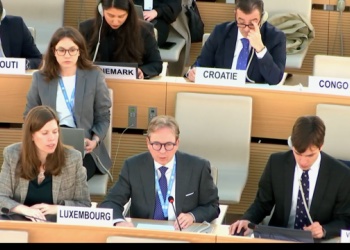Source: www.bic.org

GENEVA—19 March 2024—The United Nations Special Rapporteur on human rights in Iran, as well as a wave of UN Member States, highlighted the “extreme” persecution of Iran’s Baha’i community at the Human Rights Council in Geneva yesterday.
Delivering his final report(link is external) on 18 March, Javaid Rehman told Council members: “I am extremely distressed and shocked at the continuing, persistent persecution, arbitrary arrests, and harassment of members of the Baha’i community,” adding later that “tragically, the Baha’i minority is facing extreme persecution, targeting, and repression. … I’ve warned the authorities to immediately stop these crimes … for which they will be held accountable.”
The Special Rapporteur said in his report that Baha’is “continue to be the targets of discriminatory legislation and persistent persecution” because they are unrecognized by the Islamic Republic constitution.
Dr. Rehman’s written report, which he presented to the Council, documented in detail the widespread persecution against the Baha’is in Iran.
“For over four decades, members of the Baha’i faith, as the largest non-Muslim and constitutionally non-recognized religious minority, have suffered from the most egregious forms of human rights violations, including executions, persecution, deprivation of property rights, desecration and destruction of cemeteries, violence and arbitrary arrests, denial of educational rights, closures of businesses, hate propaganda and social injustices, and inequalities in all fields of public and private life.”
In his oral report to the Council(link is external), Dr. Rehman also referred to the recent bulldozing and desecration of more than 30 new graves of Iranian Baha’is at a mass grave site in Tehran. The Baha’i International Community (BIC) reported the destructions earlier this month, calling them “unprecedented and inhumane,” and denouncing the Iranian government’s attempt to “cleanse” the memory of the deceased Baha’is from Iranian society.
Referring to the same incident Simin Fahandej, BIC Representative to the United Nations in Geneva, said in her statement, delivered at the Human Rights Council(link is external): “These were human beings, each with a lived story of tremendous suffering and persecution for their faith … Among them was an elderly woman whose husband was executed for being a Baha’i, her sons banned from universities, also for their faith, and then both imprisoned for years, resulting in her raising their young children.”
“Today, we ask the Iranian government, what threats do the dead pose to society? How do you justify your acts, in your conscience, knowing that even in death you do not leave Baha’is in peace, imposing brutality on them even in their grief? There is no religious or cultural norm that would ever support this kind of cruelty,” Ms. Fahandej added.
The Special Rapporteur’s report headlined a charged session of the Human Rights Council during which several UN Member States mentioned the persecution of Baha’is in Iran and called on the Iranian government to end discriminatory practices and to collaborate with UN human rights mechanisms.
Belgium(link is external) said it is “appalled by the human rights violations against, and persistent discrimination of, minorities in Iran, including the Baha’i community.”
Canada(link is external) said it is “alarmed by the range and severity of human rights violations carried out by the Iranian authorities,” citing the persecution and discrimination of Baha’is and other minorities.
Luxembourg(link is external) in its statement called on the Iranian authorities to “respect and fully protect the human rights of all,” and to “end the culture of impunity” and to “fully collaborate with the Special Rapporteur, particularly by affording him unhindered access to the country,” and it insisted that the Iranian government should “cease intimidation, aggression and arbitrary arrests suffered by … members of the Baha’i community.”
Moldova(link is external) added that the “minorities continue to be subject to institutionalized discrimination and frequently to systematic persecution, including the situation of the Baha’i community … remains of grave concern.
And the United Kingdom(link is external) said Baha’is “face daily discrimination, whether accessing education, jobs, or places to worship … [and] arbitrarily detained, forced from their lands, and denied burial rights.”
Australia also called on Iran’s government to end its persecution against “Kurds, Baluchis, Arabs, and members of the Baha’i Faith.”
The Special Rapporteur’s written report also cited “at least 70 Baha’is” who are in detention or serving prison sentences—with another 1,200 facing court proceedings or “harsh and lengthy prison sentences.”
The homes of almost 100 Baha’is families have been searched and ransacked since October 2023, Dr. Rehman said in his report, and during property confiscations the authorities have seized cash, bank cards, jewelry, property deeds, identity documents and passports, electronic devices, and sacred books.
Armed agents have also intimidated Baha’is through physical violence, verbal harassments and aggression, and even threats at gunpoint, the report said.
Dr. Rehman’s report was his last after six years as Special Rapporteur on the human rights situation in the Islamic Republic of Iran. “I remain hopeful that the mandate [of the Special Rapporteur] would continue to be the voice of millions of Iranians,” he told the Council, acknowledging the many Iranians “who are targeted, victimized, and abused, and whose fundamental rights are violated persistently and with impunity.”
“As I end my six-years mandate, I would like to sincerely thank the Iranian people for their bravery, courage, resilience, as well as for their support and positive engagement with my mandate,” he added.
And in a separate statement, the BIC’s Ms. Fahandej thanks Dr. Rehman for his dedication to human rights.
“The global Baha’i community extends its deep thanks and appreciation to Dr. Javaid Rehman for his years of service as Special Rapporteur and for his tireless efforts for the Baha’is community and his repeated calls to the Iranian government to end the harassment of Baha’is, and indeed all Iranians who seek equal rights,” Ms. Fahandej said. “We echo his hopes of a future Iran that no longer needs a UN human rights special rapporteur and that its government recognizes and upholds the rights of all.”
Leave a Reply